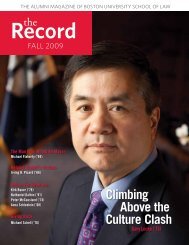the nature of representation: the cherokee right ... - Boston University
the nature of representation: the cherokee right ... - Boston University
the nature of representation: the cherokee right ... - Boston University
Create successful ePaper yourself
Turn your PDF publications into a flip-book with our unique Google optimized e-Paper software.
2005] THE NATURE OF REPRESENTATION 143<br />
removal specifically because <strong>the</strong>y exercised <strong>the</strong>ir delegate <strong>right</strong> under <strong>the</strong> Treaty,<br />
essentially blaming <strong>the</strong> victim for attempting to make <strong>the</strong> best out <strong>of</strong> an oppressive<br />
situation. 264<br />
Finally, given today’s political environment asserting delegate <strong>representation</strong><br />
could limit Cherokee future claims for more meaningful <strong>representation</strong>. The<br />
Cherokee Nation is moving forward on <strong>the</strong> Article 7 provision, for <strong>the</strong> new<br />
Cherokee Constitution approved by referendum calls for such a delegate. 265 While<br />
Article 7 does not facially limit <strong>the</strong> Cherokees to a non-voting delegate, <strong>the</strong> choice<br />
is strategic: a non-voting delegate is less threatening and more likely to receive<br />
political support. Additionally, <strong>the</strong> circumstances surrounding removal support <strong>the</strong><br />
belief that <strong>the</strong> Cherokee <strong>right</strong> originally stipulated a non-voting delegate because<br />
<strong>the</strong> Cherokees were moving to territory whose o<strong>the</strong>r residents would at most be<br />
entitled to a non-voting delegate. 266 Thus, <strong>the</strong> Cherokee Nation’s choice should<br />
not be dismissed as solely tactical.<br />
Given <strong>the</strong> Supreme Court’s reframing <strong>of</strong> <strong>the</strong> earlier deputy promise to be a mere<br />
agent in Cherokee Nation v. Georgia, 267 <strong>the</strong> Cherokee Nation probably correctly<br />
understands that, when seeking to exercise <strong>the</strong>ir delegate <strong>right</strong>, <strong>the</strong> Court is more<br />
likely to support a narrow ra<strong>the</strong>r than a broad interpretation <strong>of</strong> <strong>the</strong> delegate <strong>right</strong>.<br />
Even if <strong>the</strong> Court were to follow <strong>the</strong> Marshall based canons <strong>of</strong> construction for<br />
Indian treaties providing that “Indian treaties must be liberally construed in favor <strong>of</strong><br />
<strong>the</strong> Indians,” 268 <strong>the</strong> Cherokees would still not be entitled to a voting delegate.<br />
Their “reasonable expectations” likely extend only to <strong>the</strong> <strong>right</strong> <strong>of</strong> a non-voting<br />
delegate, <strong>of</strong> <strong>the</strong> sort that would represent an area beyond <strong>the</strong> boundaries <strong>of</strong> <strong>the</strong> <strong>the</strong>n<br />
existing states. The risk is <strong>the</strong>refore not so much that by pushing for a non-voting<br />
delegate <strong>the</strong>y are sacrificing any <strong>right</strong>s <strong>the</strong> Cherokees might have to a voting<br />
delegate; instead, <strong>the</strong> Cherokees risk that a future, more enlightened polity that<br />
decision to not allow a tribe to put land into trust. TheCourt’s approachalso suggests<br />
that a suit based on <strong>the</strong> wrongs <strong>of</strong> removal would not be very successful. City <strong>of</strong> Sherill<br />
v. OneidaIndian Nation <strong>of</strong>New York, 125 S. Ct. 1478 (2005).<br />
264<br />
Borrowing from contract law, Cherokee attempts to secure <strong>right</strong>s contained in <strong>the</strong><br />
removal treaty could be viewed as <strong>the</strong> Cherokees simply acting on <strong>the</strong>ir duty to mitigate<br />
<strong>the</strong> damages from <strong>the</strong> U.S. violation <strong>of</strong> <strong>the</strong> treaties preceding removal.<br />
265<br />
Constitution <strong>of</strong> <strong>the</strong> Cherokee Nation, Article VI, Section 12,<br />
http://www.<strong>cherokee</strong>.org/ (follow “Commissions” <strong>the</strong>n “Constitution Conv”<br />
hyperlinks in side bar; <strong>the</strong>n follow “1975 – Constitution <strong>of</strong> <strong>the</strong> Cherokee Nation <strong>of</strong><br />
Oklahoma” hyperlink) (last visited Dec. 3, 2005). Having been approved by <strong>the</strong><br />
Cherokees, <strong>the</strong> Cherokee Constitution is awaiting BIA sign-<strong>of</strong>f. See Eric Lemont,<br />
Overcoming <strong>the</strong> Politics <strong>of</strong> Reform, supra note 255 (discussing <strong>the</strong> Constitution and<br />
<strong>the</strong> efforts <strong>of</strong> <strong>the</strong> Cherokees at <strong>the</strong>ir Constitutional Convention); see also Eric Lemont,<br />
Developing EffectiveProcesses<strong>of</strong> American Indian Constitutional and Governmental<br />
Reform, supra note 206.<br />
266<br />
The Cherokees were removed west <strong>of</strong> <strong>the</strong> Mississippi, beyond <strong>the</strong> leading edge <strong>of</strong><br />
<strong>the</strong> westward expansion <strong>of</strong> areas that had reached statehood.<br />
267<br />
30 U.S. (5 Pet.) 1 (1831).<br />
268<br />
Wilkinson & Volkman, supra note 151, at 617.









